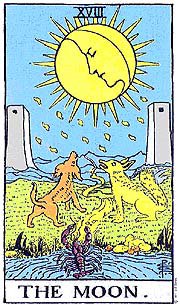The year of living now.
 As I'm sure is true of many people in my profession, or any other profession that requires training and drive and foresight and desire, I have spent much of my life living a few years in advance of where I am. In high school, I was checking college entrance requirements. By the end of high school, I was figuring out the requirements for admission to Ph.D. programs. In college, I was thinking about postgraduate fellowships and graduate school. In graduate school, I was thinking about jobs. Until last spring, I continued to think about the job market, the next move, the place I'd head to in order to launch my career. (It occurs to me that there's a not-bad pun on "tenure" to be made in the phrase "tenure-track"; in my tenure year, if I count the years I was on the market or in temporary gigs, I'll truly have come to the end of a ten-year track. It's not an actual end, of course; in a way, it's a kind of arbitrary marker in a professional career. And yet, in all other ways, it's far more than an arbitrary marker. But--as befits my topic today--I'm getting ahead of myself.)
As I'm sure is true of many people in my profession, or any other profession that requires training and drive and foresight and desire, I have spent much of my life living a few years in advance of where I am. In high school, I was checking college entrance requirements. By the end of high school, I was figuring out the requirements for admission to Ph.D. programs. In college, I was thinking about postgraduate fellowships and graduate school. In graduate school, I was thinking about jobs. Until last spring, I continued to think about the job market, the next move, the place I'd head to in order to launch my career. (It occurs to me that there's a not-bad pun on "tenure" to be made in the phrase "tenure-track"; in my tenure year, if I count the years I was on the market or in temporary gigs, I'll truly have come to the end of a ten-year track. It's not an actual end, of course; in a way, it's a kind of arbitrary marker in a professional career. And yet, in all other ways, it's far more than an arbitrary marker. But--as befits my topic today--I'm getting ahead of myself.)Once I had my feet firmly on the tenure track, I looked around, instead of straight ahead, for the first time in a long time. I started feeling out the contours of an actual, long-term life here, instead of holding my feelers in, tight, where they wouldn't be vulnerable. Since June, I've periodically found it difficult to explain my desire to pause in the relentless ongoingness of adult life--which isn't a desire to stop, by any means, much less to stop short. It's a recognition of particular ways that my life has been out of alignment, pulling to one direction, for more than half my life.
Imagine your life's (or your consciousness's) existing in two time dimensions. One happens across time, working its way through from your past into your present and beyond, to your future. This dimension is the one from which Ebenezer Scrooge utterly disconnects himself in the part of his life that takes place before A Christmas Carol and that, as many of my students are working up arguments about right now, he must reclaim in order to be a moral and truly alive human being. If you want a fancy theoretical term for this dimension, you can call it "diachronic"--taking place through time. The other dimension is lateral, happening within any given present moment. This dimension isn't, ideally, disconnected from the diachronic one; that is, we don't live in just a present moment, with no sense of a past or of a future. Or at least--as we see through Scrooge's example in Dickens's novella--if we do live just in a present, we risk living in an utterly impoverished way. But, properly balanced by its complement, this dimension--call it "synchronic," or in the same time--is where we do our richest living in the present. It's in our synchronic experience that we know the strength with which we've put our roots out in the past, and the desire or hope or terror with which we're stretching out towards or shrinking back from what's coming next.
 In those years of aiming at a target somewhere ahead of me, I had terrific synchronic experiences, to be sure. You're hearing about some of them in these sketches. But when given a chance and a choice, I nearly always sided with the needs of my diachronic existence, my future plans, the better thing that would be arriving within a few years. In all that time, I managed to stoke my inborn impatience, and to craft for myself some difficulties with staying put. I wouldn't call impatience and restlessness hallmarks of my character, particularly because they manifest themselves in strange ways that might read as completely different character traits to those around me. That is, my impatience doesn't make me a timely person. My restlessness doesn't prevent me from sitting still for hours and hours, focusing on a single task. But I do tend to need narrative trajectories into which I can slot whatever tasks I'm up to--some sort of story that helps my present make sense.
In those years of aiming at a target somewhere ahead of me, I had terrific synchronic experiences, to be sure. You're hearing about some of them in these sketches. But when given a chance and a choice, I nearly always sided with the needs of my diachronic existence, my future plans, the better thing that would be arriving within a few years. In all that time, I managed to stoke my inborn impatience, and to craft for myself some difficulties with staying put. I wouldn't call impatience and restlessness hallmarks of my character, particularly because they manifest themselves in strange ways that might read as completely different character traits to those around me. That is, my impatience doesn't make me a timely person. My restlessness doesn't prevent me from sitting still for hours and hours, focusing on a single task. But I do tend to need narrative trajectories into which I can slot whatever tasks I'm up to--some sort of story that helps my present make sense.I suppose that one could say that since June I've been trying to cultivate a more modernist approach toward my own life--more of a focus on, or a relearning of, those aspects of my present moments' shapes and colors and textures. Rather than forcing myself into the next chapter of some master narrative, or moving on to the next project's beginning, middle, and end, I'm making concerted efforts to learn how to do what needs to be done on a given day, or in a given moment, without over-reference to what might happen days or months or years from now.
Reorienting one's way of being in the world is difficult, I'll tell you, particularly when one comes to those parts of lives that are already over-narrated and over-determined by abstract, impersonal forces and pressures. Some of those imperatives are things I've opted out of, one by one, over the years, but some of them have been pretty tenacious. The "higher standard of living than one's parents" narrative? I think I stepped aside from that as soon as I made the choice (which never, itself, felt like a choice) to go into academia, not the corporate world or law or medicine. That choice itself was, I do know, determined by my family's standard of living. The "marriage and children" narrative? That one has come apart a little more gradually. As I tell my students, when it's appropriate (which it turns out to be, for about one student, about once a year), it took me until age 25 to figure out that I wouldn't marry at 21 as my mother had. And I was 27 or 28 before it dawned on me that I was feeling absolutely no impulse toward childbearing. (My body may have its own ideas, but I think that I'm going to win this one.) The "nice house and nicer car" narrative? My verdict's still out on this one, but I'm honestly, honestly not ready to be in this one yet. Too many other narratives are starting and stopping, clicking on and off like the Krispy Kreme doughnut mechanized doughnut-making assembly line or some Allen-Bradley control panel or, oh, I don't know, my rapid-cycling washing machine over there on the other side of the kitchen, for me to tangle with this one very much right now.
My favorite one to debunk for my students is the "one true love" narrative, which my Bostonian friend helped me take apart for myself a few years ago, telling me her theories of how love and choice intersect and in some sense render "destiny" and "fate" simply irrelevant, except where basic dumb luck and timing come into things. In discussing Jane Eyre the other day, one of my students pointed out the strangeness of Jane's abiding, consuming love for Rochester, one of the first men she's ever spent any time around at all. At all. Some confessed feeling creeped out by the whole thing. Others claimed, in classic undergraduate speak, "I don't buy it." (I hate that commercial metaphor for disbelief or absence of persuasion. As if Bronte were selling us Jane's love. As if.) I warned them to beware of this one, because it's toxic, really. The hopeless romantic in me still wants it to be true. The hopeful realist simply says no, just as Nancy Reagan taught me to do when faced with an addictive intoxicant. The first time may be free, sure, but the second time will hook you, and eventually you'll end up gutted and flopping on a deck somewhere.
 None of this is to say that life has taken some grim turn. Far from it: despite a prediction of snowfall today, right now we're looking at a sunny afternoon that could be yet another premature harbinger of spring. As last week's snow recedes more and more, those little yellow flowers are becoming visible. I could almost think that the snow will turn out to be a bad-dream kind of prediction--could almost hope that I'll emerge into the night tonight and not regret being in evening clothes, or that I'll wake up tomorrow and find that it's 60 degrees again and that (pathetic fallacy alert) the world is singing along with my happy heart. But I also know enough, can see enough, can imagine enough to know that it may well be cold and a tiny bit treacherous on the road home this evening, that I may need some more of those living-in-moment reserves, that I may have to call myself out later as having been a hypocrite liar-to-self or at least an overly optimistic believer in my own stoic capabilities. But seriously? it doesn't seem like too much to ask that I just be able to be here for now, whatever the lineaments of here turn out to be, now that I'm taking the time to trace them.
None of this is to say that life has taken some grim turn. Far from it: despite a prediction of snowfall today, right now we're looking at a sunny afternoon that could be yet another premature harbinger of spring. As last week's snow recedes more and more, those little yellow flowers are becoming visible. I could almost think that the snow will turn out to be a bad-dream kind of prediction--could almost hope that I'll emerge into the night tonight and not regret being in evening clothes, or that I'll wake up tomorrow and find that it's 60 degrees again and that (pathetic fallacy alert) the world is singing along with my happy heart. But I also know enough, can see enough, can imagine enough to know that it may well be cold and a tiny bit treacherous on the road home this evening, that I may need some more of those living-in-moment reserves, that I may have to call myself out later as having been a hypocrite liar-to-self or at least an overly optimistic believer in my own stoic capabilities. But seriously? it doesn't seem like too much to ask that I just be able to be here for now, whatever the lineaments of here turn out to be, now that I'm taking the time to trace them.sources for today's images: Inner Vision, a tarot site (please note that I am not a tarot believer and am not offering these three cards as signifiers of anything but my appreeciation of their three representations; however, I also don't mean to be frivolous or flippant with systems in which others believe).


2 Comments:
The "I don't buy it" objection -- in the double sense of your students' objections and your own objection to this particular phrase -- is a tricky one, I think. By putting her book into the literary marketplace, isn't Bronte (in some sense) commodifying Jane's love for Rochester? When our students say that they don't "buy" something, are they actually saying that the financial transaction which necessarily preceded their act of reading -- they did have to BUY those copies of Jane Eyre, after all -- remains incomplete or has somehow gone wrong? And does the fact that the book itself is thinking about the economies of love -- alongside a whole host of other economies -- actually afford a valuable opportunity to examine our own economically-oriented rhetoric?
Just a thought... :)
Oh, now, that's interesting. It's entirely possible that that line is so overcoated with layers of tongue-tsking and dramatic sighing that I haven't been able to hear the serious elements wrapped up in it. And in fact, what I actually do hope is that they don't buy into the constructs too easily--which is not, of course, to say that I don't believe that some people (cf. my mother and father) do fall in love and stay there.
Have you been writing tonight? You've got the rhetoric going on, guy!
Post a Comment
<< Home